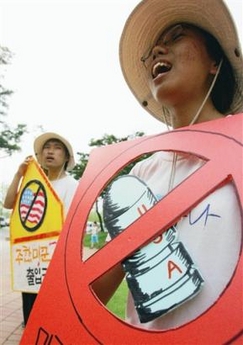Believe Me, Not Your Eyes
Welcome to the new, independent South Korea–the one that bravely sets its own policy direction without regard for how Yankee imperialists may view it:
The Foreign Ministry is hiring an American PR firm to put a positive spin on its U.S. policies in a nation that has been reading them as increasingly hostile.
The Foreign Ministry recently wrote to the parliamentary Unification, Foreign Affairs and Trade Committee asking for an extra budget of W1.2 billion (about US$1.2 million) next year to pay for the plan, which would take PR work off the hands of the Korean Embassy in Washington.
One wonders exactly how much of this money will go into the hands of the PR firm, and how much is intended for the–sorry–whores who would accept it. The idea here is to correct “misconceptions” about Korea’s diplomatic and security policies among Americans, and to take on the “urgent task” of improving Americans’ perceptions about Korea’s diplomatic and security policies. Presumably, they also intend to attack the spurious myth that South Koreans are anti-American.
“There are limits to what embassy staff can do to deal with U.S. opinion leaders like journalists, academics and lawmakers in a systematic way. Local PR firms know the internal situation in the U.S. best and have the necessary connections,” the ministry said. “We have to turn around U.S. public opinion about Korea’s diplomatic and security policies and relations to the U.S., and we are going to look for ways of countering smears and attacks against Korea.
The firm would try to bring influential Americans on side to give Korea’s position in major U.S. newspapers, persuade broadcasters to report positively on the country and let experts speak for Korea.
Several comments come to mind. The first is that I now have another opening to flog these photographs:



The second is how sadly revealing this is of how Korea approaches American politics, and what that says about Korea’s own political system. Apparently, South Korea feels that “connections” can smooth over any damage that facts have already done. We saw this with the Tongsun Park scandal, and in ex-Ambassador Hong’s selection, and in his own abortive effort to attack some of the same widely-held American “misconceptions” before he was forced to resign over (ahem) an influence-peddling scandal.
One is entitled to wonder just what the strategy of this campaign will be, and whether it will identify Korea’s image problem in the United States correctly. That problem is not really with all Americans, since far too few concern themselves with the minutiae of U.S. foreign policy. Nor is the problem with all influential Americans and foreign policy activists; some, mainly from the so-called “progressive” left, have long called for a U.S. withdrawal from Korea. This wing of the Democratic Party is in a strongly isolationist mood and now exercises far more influence over the party leadership and nominating process than it did when Bill Clinton was nominated just over a decade ago. The person most identified with Democrats’ more hawkish alternative? Hillary Clinton.
That leaves South Korea to work on regaining the support of American conservatives, the alliance’s traditional–and now, alienated–base of U.S. support. This will require more than extraordinary effort (one hopes that even copious amounts of money will not suffice). As a bare minimum, it will require the South Korean government to act firmly against anti-American violence and discrimination directed at U.S. soldiers, the surest way to infuriate conservative voters. South Korea could easily do this without making any fundamental policy compromises.
The more difficult choice involves jettisonning the very policy foundations of South Korea’s current government–its refusal of most North Korean refugees who reach the doors of its embassies, its unconditional aid to North Korea, diplomacy that consistently undermines U.S. diplomatic positions, the dropping of North Korea as the South’s “main enemy,” and its indefensable diplomatic silence on the North’s horrendous human rights record. Those are facts, not misconceptions. A truly independent nation would confidently pursue the policies of its elected leaders without fear of foreign reaction. It reveals South Korea’s own sense of dependency that it instead attempts to portray these policies as things they are not.
The current image offensive, like the last one, suggests that Korea’s goal is to purchase enough influence in America to allow it to pursue two mutually contradictory goals: foreign policies that undermine U.S. interests, and a defense policy that depends on lavish subsidies from U.S. taxpayers and the psychological value of keeping its children exposed to danger and inhospitality on its own soil.
No doubt, some Americans–mainly to the left of center in the U.S. media and foreign policy establishment–are quite ready to be influenced by the South Korean government, but the facts of Korea’s policies will continue to erode South Korea’s image rapidly among U.S. conservatives as long as they continue to learn of those policies and the emotions that propel those policies.
It is not the existence of Korea’s anti-American mood or policies that alienates Americans, so much as it is the expectation that the U.S. will continue to subsidize them.
Update: GI Korea has more.